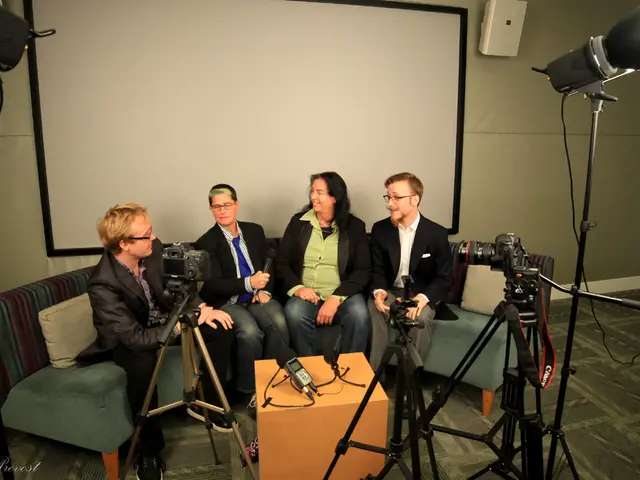Expanding Influence of AI on Employment Highlighted in Recent Developments
Artificial Intelligence (AI) is shaking up industries, reshaping careers, and revolutionizing the workplace like never before. Buckle up! This ain't your grandma's job market.
In this no-holds-barred overview, we'll explore the transformative effects of AI and the skills you'll need to succeed in this brave new world. So let's dive in and make sure you're ready for the ride.
Where AI's Stompin' Ground Reaches
AI has burst into several sectors, wielding its power to automate processes, boost productivity, and unleash innovation. Key players include manufacturing, healthcare, retail, and professional services, with more industries catching on every day.
In manufacturing, AI powers technologies like robotics and maintenance systems for optimization, reduced downtime, and flagship product quality. Sounds good, right? Well, it's also likely to mean a major shake-up in manual roles.
The healthcare industry ain't laggin' behind, either. AI is helping doctors conquer diseases earlier than Captain Planet could save the Earth, all while disappearing boring tasks like data entry into thin air. Yep, you guessed it—medical environments are being re-shaped too.
Retail's getting a taste of the AI revolution, too, with solutions like inventory automation, recommendation engines, and chatbots empowering a smooth shopping experience for everyone. And in professional services, algorithms are lending a helping hand, taking legal reviews, financial analyses, and HR processes off our plates, all while keeping the precision uncannily human.
The Skills You'll Need to Succeed in This AI-Fueled World
As AI adoption grows, the playin' field is changin' too. To thrive in this evolving landscape, you gotta develop a solid mix of technical chops and soft skills.
On the technical side, a working knowledge of coding, data analysis, and understanding AI frameworks will be more valuable than the Google's search engine. Add some programming languages like Python or R to your arsenal, and get ready to use your machine learning tools with the expertise of a seasoned astronaut.
Don't forget about the soft skills, either. Capabilities like creativity, problem-solving, emotional intelligence, and adaptability are more vital than ever. These human-centric skills complement AI's capabilities, and you'll bring a depth of insight that machines can't fake.
AI and Us: A Match Made in Heaven
Instead of eliminating human workers, AI is increasingly being used as a collaborative tool to turbocharge productivity. Organizations are finding ways to team up humans and AI, resulting in hybrid workflows.
In the creative industries, AI tools are giving professionals the power to experiment and turn out groundbreaking ideas in a flash. Meanwhile, marketers are relying on AI analytics to bring their campaigns to new heights.
In the world of data-heavy decision-making, AI's helpin' analysts and executives sift through mountains of data in record time, allowing businesses to stay nimble and adapt to market changes like never before.
Time to Address the Elephant in the Room: Challenges Ahead
While AI brings forth a world of opportunities, it also raises critical challenges that we must face head-on. Job displacement, ethical concerns, and economic inequality are top of the list.
Manual workers in roles vulnerable to automation may end up outta luck as industries embrace AI-driven technologies. Upskillin' and reskillin' initiatives will help soften the blow, but it's gonna take some serious effort to ensure a smooth transition for all those affected.
Ethical concerns crop up, too. Issues like AI biases and data privacy need to be tackled to ensure fairness and respect for everyone. Governments and organizations need to team up to establish safeguards and promote ethical AI practices.
The Facts about AI's Impact on Employment
Data and charts give us an objective view of AI's influence on jobs, revealing that automation is causing shifts in roles demanding repetitive tasks. Simultaneously, job opportunities for data analysts, software engineers, and machine learning specialists are on the rise.
Plus, AI is advancin' at a speed that's leavin' the industrial revolutions scratchin' their heads. This pace intensifies its impacts on the workforce, illustrating why it's essential to remain informed and adaptable.
By analyzin' these trends, industries and governments can make wiser decisions about how to manage AI's effects more efficiently and equitably.
Preparin' for an AI-Dominated Future
Given the unstoppable march of AI, it's essential to get a-head of the game to capitalize on its transformative powers. Governments, educational institutions, and organizations need to collaborate to ensure that professionals are equipped for an AI-driven workforce.
Programs like lifelong learning initiatives, technical boot camps, and workshops funded by the government will play a crucial role in helping workers transition into new roles. By fostering ongoing education and offering equal opportunities, societies can build a resilient workforce that's ready to adapt to the demands of the future.
Individuals can also take charge of their futures, by gaining AI-related certifications or diving into online coursework for emerging technologies. Stayin' now, folks—the future of work is bein' shaped now!
In conclusion, AI's impact on jobs is reshapin' industries, careers, and the way we work in profound ways. Embrace its challenges and opportunities, develop the skills you need, and collaborate with AI to build a future that's brighter than ever before. Because this ain't the end of the story—it's just the beginning.
- In the manufacturing sector, AI is revolutionizing industries through technologies such as robotics and maintenance systems, which optimize and reduce downtime, but this could lead to a significant shift in traditional manual roles.
- In the healthcare industry, AI is helping doctors combat diseases earlier and automating mundane tasks like data entry, leading to a restructuring of medical environments.
- For professionals in the education-and-self-development and career-development fields, having skills in areas like coding, data analysis, machine learning, programming languages such as Python or R, and soft skills like creativity, problem-solving, emotional intelligence, and adaptability will be crucial for success in an AI-driven world.








